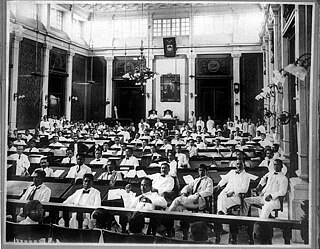The 7th Congress of the Philippines, composed of the Philippine Senate and House of Representatives, met from January 26, 1970, until September 23, 1972, during the fifth, sixth, and seventh years of Ferdinand Marcos's presidency. On September 23, 1972, President Marcos effectively dissolved the Congress with his declaration of martial law. Marcos then exercised legislative powers. In 1976, Congress was replaced by the Batasang Bayan as the Philippines' legislative body until 1978, when it was replaced by the Batasang Pambansa.
The 1st Congress of the Philippines, composed of the Philippine Senate and House of Representatives, met from May 25, 1946, until December 13, 1949, during the 22-month presidency of Manuel Roxas and the first two years of Elpidio Quirino's presidency. The body was originally convened as the 2nd Congress of the Commonwealth of the Philippines. On August 5, 1946, Republic Act No. 6 was approved, renaming the body as the 1st Congress of the Philippines.
The 2nd Congress of the Philippines, composed of the Philippine Senate and House of Representatives, met from December 30, 1949, until December 8, 1953, during the second term of President Elpidio Quirino.
The 3rd Congress of the Philippines, composed of the Philippine Senate and House of Representatives, met from January 25, 1954, until December 10, 1957, during the 39-month presidency of Ramon Magsaysay and the first nine months of Carlos P. García's presidency.
The 4th Congress of the Philippines, composed of the Philippine Senate and House of Representatives, met from January 27, 1958, until December 13, 1961, during the second term of President Carlos P. Garcia.
The 5th Congress of the Philippines, composed of the Philippine Senate and House of Representatives, met from January 22, 1962, until December 17, 1965, during the presidency of Diosdado Macapagal.
The 6th Congress of the Philippines, composed of the Philippine Senate and House of Representatives, met from January 17, 1966, until June 17, 1969, during the first three-and-a-half years of Ferdinand Marcos's presidency.

The 12th Congress of the Philippines, composed of the Philippine Senate and House of Representatives, met from July 23, 2001, until June 4, 2004, during the first three years of Gloria Macapagal Arroyo's presidency. The convening of the 12th Congress followed the 2001 general elections, which replaced half of the Senate membership, and the entire membership of the House of Representatives.
The 1st Philippine Legislature was the first session of the Philippine Legislature, the first representative legislature of the Philippines. Then known as the Philippine Islands, the Philippines under the sovereign control of the United States through the Insular Government. The Philippine Legislature consisted of an appointed upper house, the Philippine Commission, and an elected lower house, the Philippine Assembly. These bodies were the predecessors of the Philippine Senate and Philippine House of the Philippine Congress.
The 2nd Philippine Legislature was the meeting of the legislature of the Philippines under the sovereign control of the United States from March 28, 1910, to February 6, 1912.

The 4th Philippine Legislature was the meeting of the legislature of the Philippine Islands under the sovereign control of the United States from October 16, 1916, to March 8, 1919.
The 1st National Assembly of the Philippines was the meeting of the legislature of the Commonwealth of the Philippines from November 25, 1935 until August 15, 1938, during the first three years of Manuel L. Quezon's presidency.
The 2nd National Assembly of the Philippines was the meeting of the legislature of the Commonwealth of the Philippines, from January 24, 1939, until December 16, 1941, during the fourth, fifth, and sixth years of Manuel L. Quezon's presidency.
The 5th Philippine Legislature was the meeting of the legislature of the Philippines under the sovereign control of the United States from 1919 to 1922.
The 7th Philippine Legislature was the meeting of the legislature of the Philippines under the sovereign control of the United States from 1925 to 1928.
The 8th Philippine Legislature was the meeting of the legislature of the Philippine Islands under the sovereign control of the United States from 1928 to 1930.
The 9th Philippine Legislature was the meeting of the legislature of the Philippines under the sovereign control of the United States from 1931 to 1934.
The 10th Philippine Legislature was the meeting of the legislature of the Philippines under the sovereign control of the United States from 1934 to 1935.
Elections for the members of the House of Representatives were held on June 6, 1922, pursuant to the Philippine Organic Act of 1902, which prescribed holding elections every three years. The ruling Nacionalista Party was split into the Colectivista and the Unipersonalista factions. If combined, both blocs formed the largest party grouping in the House, with 64 of the 93 members. The Democrata Party emerged as the strongest opposition party since then Progresistas of the 1910s, winning 25 seats.
Elections for the members of the House of Representatives were held on June 2, 1925 pursuant to the Philippine Organic Act of 1902 which prescribed elections for every three years. The ruling Nacionalista Party, which was split into Colectivista and Unipersonalista factions in 1922, were reconciled and were named as the Nacionalista Consolidado Party. The party continued their hold of the House of Representatives retaining their number of seats from the previous election, and the majority.



